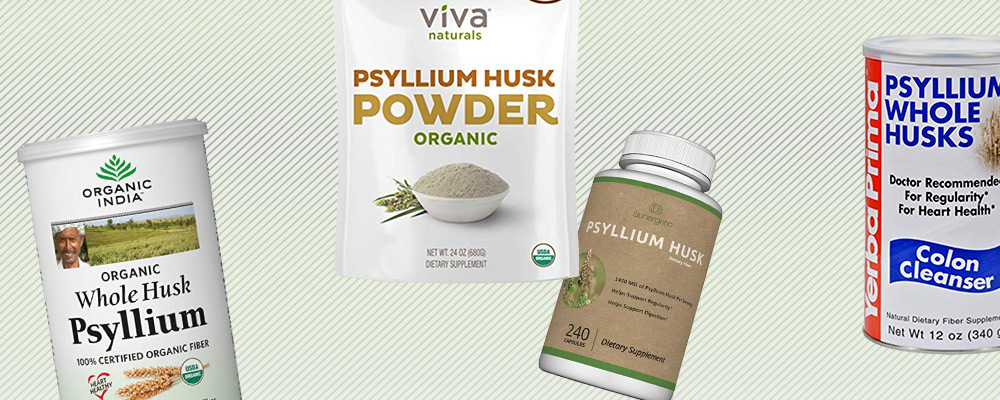National surveys indicate that only about 5% of Americans are getting enough fiber on a daily basis (1). Since a healthy intake of fiber is associated with a number of health benefits – most notably digestive health and managing cholesterol levels – getting an adequate amount of fiber in your diet should be a priority. One way you might up your fiber intake is to turn to a supplement. Psyllium husk is a soluble fiber made from seeds of the plantago ovata plant. It’s commonly used to help with constipation and for overall digestive health. This soluble fiber absorbs water in the gut and essentially creates a gel, resulting in easier bowel movements, more regularity, and even making stool softer. There’s also some evidence to support its role as a cholesterol regulator, helping to lower “bad” cholesterol and raise “good” cholesterol (2)(3).
While fiber is readily available in a number of fruits and vegetables, folks adhering to a low-carb diet may not be getting enough fiber in their regular diets. Men and women aged 50 and under are encouraged to ingest 38g and 25g of fiber on a daily basis, respectively, with those values decreasing a bit as we age (4). For some, psyllium may be a convenient way to increase your fiber intake. Consult a medical professional before deciding to add this supplement to your diet. There are a lot of psyllium options on the market. With so many options, it’s important to know how to distinguish between different features.
Editors’ Choice
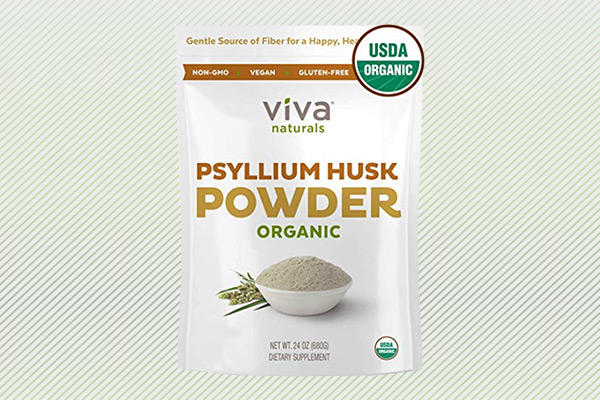
Viva Naturals Organic Psyllium Husk Powder
Pros:
- Each 5g serving can easily mix into a drink or a smoothie. Additionally, Viva Naturals includes readily accessible recipes to help you create gluten-free, fiber-friendly baked goods.
- This powder is certified organic and non-GMO.
- At just a bit more than a dime per serving, this is a very cost friendly source of psyllium.
- Many reviewers noted that any taste from the powder is easily masked if mixed into a juice.
Cons:
- Though this powder mixes alright, a lot of folks noted that it can get lumpy quite quickly, so you may need to drink it down quickly.
- When baking with this psyllium husk powder, your breads may come out with a purple hue.
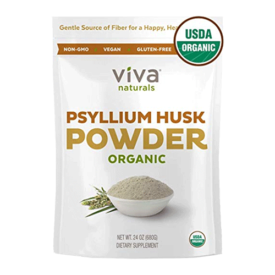
Viva Naturals offers a very competitively priced psyllium husk powder. Designed to be mixed with drinks or used in baking, this fibrous powder is an excellent choice for folks looking to cost-effectively boost the fiber in their diet.
Contender
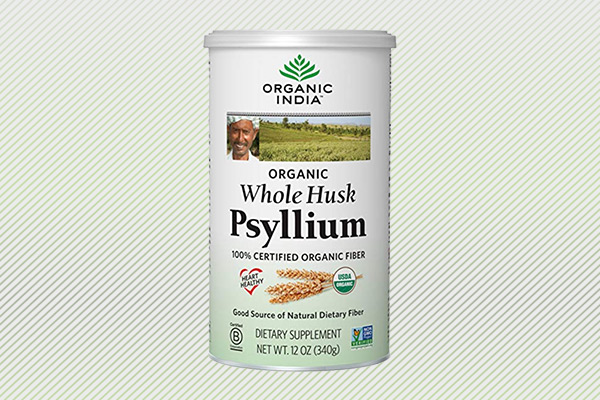
Organic India Whole Husk Psyllium
Pros:
- Each serving of these psyllium husks contains 5g of fiber.
- Organic India’s Whole Husk Psyllium is 100% certified organic, Kosher and hala, vegan-friendly, and dairy free.
- This supplement is made without any synthetic pesticides, herbicides, or chemical fertilizers.
- Rather than a powder, you’re actually getting little bits of psyllium husks.
Cons:
- Several folks mentioned that this psyllium becomes quite gelatinous shortly after mixing.
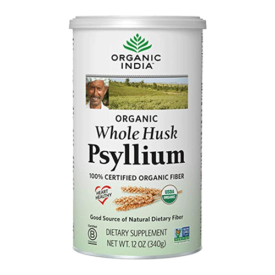
This 100% certified organic psyllium supplement comes from a company that claims to take pride in its relationship with its farmers. This 100% certified organic product is also Kosher and Halal certified.
Whole Psyllium Husk
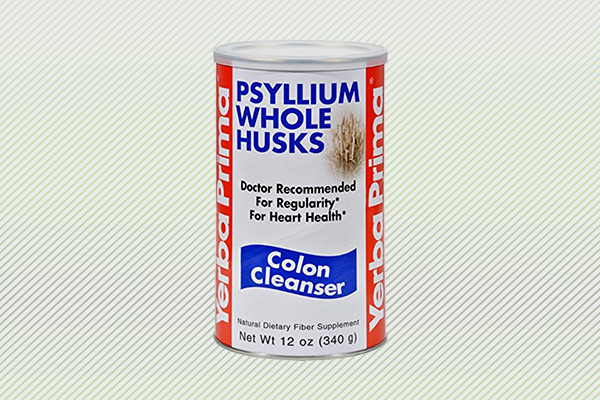
Yerba Prima Psyllium Whole Husks
Pros:
- This Certified Organic product can both be mixed into a drink or smoothie or used in baking to add fiber to your diet.
- The company remarks that this supplement is most effective when it’s used daily, though it can also be used in a pinch in case of constipation.
- There’s nothing but psyllium whole husks in this supplement; no sugar added, no artificial flavor or coloring.
Cons:
- Some customers commented that Yerba Prima’s psyllium husks have a particularly bitter taste.
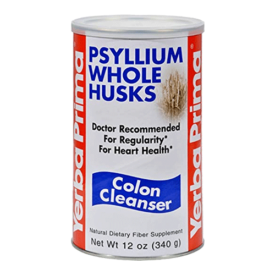
Yerba Prima Psyllium Whole Husks is just that - a container full of grainy psyllium husks. This supplement has no sugar added, nor artificial flavor or color, making it a very straightforward psyllium supplement.
Best Capsule
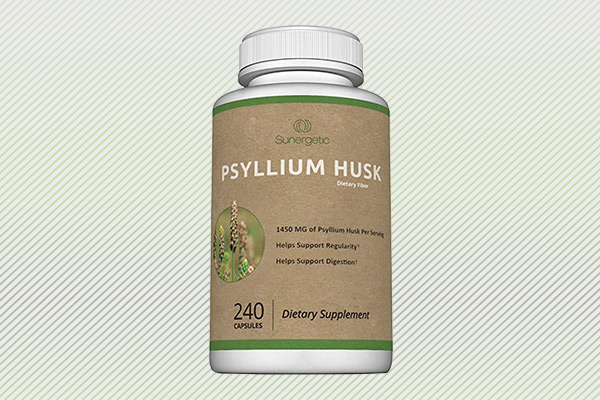
Sunergetic Psyllium Husk Capsules
Pros:
- Each capsule contains 725mg of psyllium, with a recommended serving consisting of two capsules.
- For folks who can’t stand the taste of powdered supplements, a capsule may be a more palatable option.
- If your morning routine is already packed to the gills, turning to a few capsules may be more convenient than mixing a supplement.
- Sunergetic includes a 1 year money back guarantee.
Cons:
- Because gelatin is used in the formulation of these capsules, they are not vegan-friendly.
- Though still competitively priced, on a cost-per-serving basis this will set you back a teeny bit more than some of the other supplements we looked at.
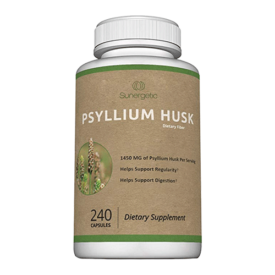
If you’re not into the idea of drinking your daily dose of fiber, you may consider opting for a psyllium husk capsule. Sunergetic offers a very straightforward psyllium capsule made from ingredients sourced from a Good Manufacturing Practices facility.
Methodology
Psyllium Husk may be a great way to add fiber to your diet if you’re one of the many people out there not getting enough on a daily basis. This soluble fiber may help keep your digestive system clicking at a regular rate, while also having some added benefits for heart health and cholesterol. When deciding which psyllium husk is right for you, it’s important to look for a few key features.
Form
When checking out the different types of psyllium husk supplements on the market, you’ll notice they come in a few different forms. Most commonly, you’ll find whole husks, powders, and capsules. Husks resemble small grains, and may give you the impression that you’re digesting something directly from nature. Powders are generally just these husks crushed up with the intention of making them a bit easier to work with. Finally, capsules give you psyllium delivery in a swallowable form.
Ingredients
Check the labels to insure you’re not buying anything with additional ingredients you may not need. Some psyllium supplements will include sweeteners or additives, while others will cut out any extraneous ingredients in favor of giving you the supplement straight.
Dosage
Many psyllium husk supplements will include a suggested serving size of 5g, but this number may vary.
How Will You Take It?
While some may prefer the flexibility a powder offers – it can be mixed into a drink or added to a baked good – others may find it cumbersome to mix up a supplement every day. Most psyllium husk supplements will mix well with liquids but then start to take a gelatin form after a few minutes; if you’re the type who likes to savor their supplements, this may not be for you.
Capsules, on the other hand may offer a quicker, easier method to get the same levels of fiber in your diet.
BarBend Tips
- Before adding psyllium to your diet, consult with a medical professional.
- Make sure you’re getting plenty of water while using a psyllium husk supplement. While it’s great for improving certain aspects of digestion, pairing it with inadequate water intake can actually have the opposite effect for some folks.
- When introducing psyllium husk to your diet, it may be best to start slowly. Rather than jumping to the full serving suggestion on day one, try easing in with a half dosage for a few days and gradually increase as your body gets used to it.
- If you’re looking to add soluble fiber to your diet, and odds are, you probably should be, try not to rely solely on supplements. Look to add fibrous fruits and vegetables to your diet, including beans, apples, and citrus fruits.
Most Americans are sorely in need of adding more fiber to their diets and psyllium husk may be a great source of soluble fiber. Before rushing to add this to your cart, consider when and how you intend to take it, and let that help to inform your decision.
References
-
Quagliani D, Felt-Gunderson P. Closing America’s Fiber Intake Gap. American Journal of Lifestyle Medicine. 2016;11(1):80-85.
-
Jovanovski E, Yashpal S, Komishon A, et al. Effect of psyllium (Plantago ovata) fiber on LDL cholesterol and alternative lipid targets, non-HDL cholesterol and apolipoprotein B: a systematic review and meta-analysis of randomized controlled trials. The American journal of clinical nutrition. 2018;108(5):922-932.
- Singh B. Psyllium as therapeutic and drug delivery agent. International journal of pharmaceutics. 2007;334(1-2):1-14.
- How to add more fiber to your diet. Mayo Clinic. https://www.mayoclinic.org/healthy-lifestyle/nutrition-and-healthy-eating/in-depth/fiber/art-20043983. Published 2018.
